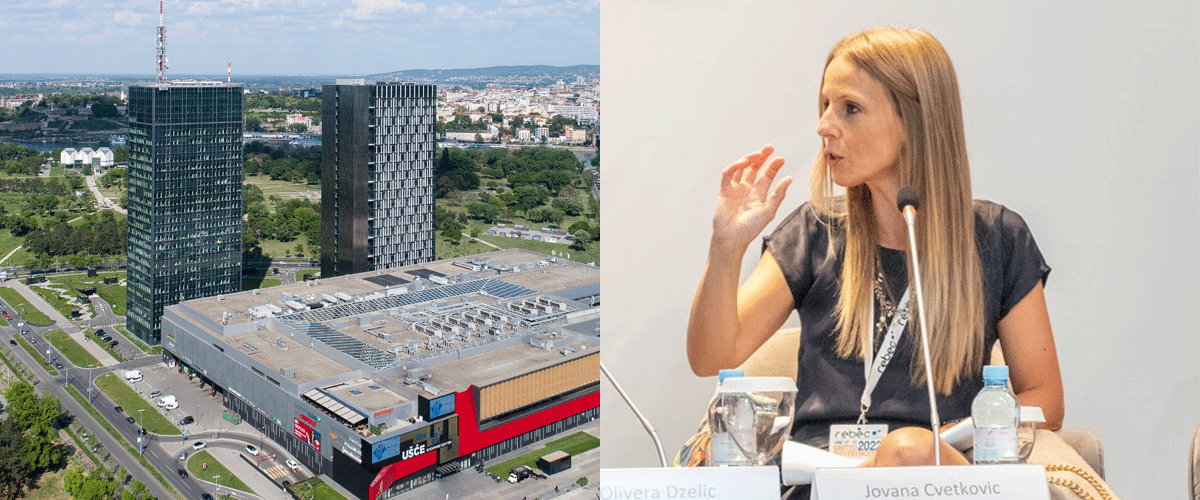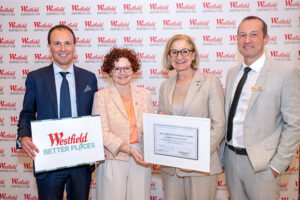Together with other international industry representatives Jovana Cvetković, Development, Technical Operations and Innovation Director at MPC Properties discussed at REBEC 2022 the topic: “ESG stories and recommendations – environment social governance”. The clear message was: ESG goals should be included in the company’s culture, policies and procedures.
What exactly is ESG? It is an initiative that includes working to achieve a certain set of environmental goals, as well as a set of goals related to the support of social movements. The third set of goals concerns the company and whether it is managed in accordance with the goals of equally nurturing diversity and equality, as well as the inclusion movement.
ESG factors are:
- Environmental: energy efficiency, climate risk, water management, recycling processes, emergency preparedness, renewable fuel, greenhouse gas emissions.
- Social: health and safety, working conditions, employee benefits, incentive programs, diversity, and inclusion.
- Governance: ethical standards, corruption, data security and privacy, stakeholder engagement, shareholder rights.
Projects in accordance with the principles of green building
When it comes to the MPC Properties ESG strategy, Jovana Cvetković says that the company, as a market leader and member of the Green Building Council, thinks strategically and long-term, and when it comes to the quality and sustainability of the buildings owned by the company, they do not compromise. “Our job is not only to develop retail and office facilities, but also to manage those assets, so it is extremely important that the projects we build are of high quality and functional, in accordance with the principles of green building, which lead to savings.”
The key strategy of green building is to consider the entire life cycle of the building, starting from the idea, planning, designing, through the execution of the works, and all the way to the operational phase. “The certification process improves the quality of the building, and the adequate selection of equipment and the correct operating mode of technical systems achieve an optimal space comfort, which additionally contributes to the reduction of: the consumption of electricity and water, the harmful impact on the environment, the emission of harmful gases, the waste, and the protection of watercourses”. added Cvetković.
The MPC-assets Navigator Business Center 1 and 2 were built according to the LEED Gold standard, UŠĆE Tower Two was designed and built according to BREEAM, while UŠĆE Shopping Center is one of the first certified shopping centers in the region and Europe to receive LEED EBOM certificate in the segment of operational functioning. “The WELL Health-Safety certificate is especially important to us because it promotes health and safety, especially considering the current situation with the covid-19 pandemic. For MPC Properties, it is a way to integrate the world’s best practice into its business operations and thereby contribute to the prosperity of the entire community”, said Cvetković.
Importance of carbon neutrality and alternative energy sources
Cvetković pointed out: “In accordance with the adopted national strategy for energy development until 2025 with a projection until 2030, in 2016 the Government of Serbia has made a Resolution according to which, for all buildings whose annual consumption of primary energy is more than 1000 toe (tons of oil equivalent), which includes UŠĆE mixed-use complex, Navigator Business complex, Mercator center Beograd and BEO Shopping Center, all taxpayers must have a permanently employed energy managers who are obliged to submit to the Ministry of energetics an annual report on energy consumption, which states the total primary energy consumption, water consumption and carbon emissions. The goal that must be met is to reduce primary energy consumption by 1% compared to the previous calendar year. In the previous five years, UŠĆE achieved an average reduction of 4.22% per year.” Furthermore, there is currently a 300 m2 solar power plant with a power of 50 kV on the roof of UŠĆE Shopping Center.
Social Aspect
When it comes to the social aspect, apart from the mentioned health and safety certificate, the emphasis is also on incentive programs intended for employees (communication skills training, professional seminars and educational programs, psychological support), as well as clients, i.e., tenants (through marketing activities and through the implementation and promotion of loyalty programs).
“Attention is also paid to socially responsible projects, activities intended for sensitive groups, in two directions, one is oriented towards the environment and reducing the negative impact of business on the environment, and the other is oriented towards people, both testifying to the positive impact on the community and the involvement of people in our activities”, Cvetković emphasized.
Conclusion
ESG in Serbia is still in its infancy, but that progress can be seen, as well as that our market has yet to be attractive. They believe that it is necessary to work on the education and social responsibility of each individual, as well as that inclusiveness and the circular economy must be seen as obligations.
About:
Jovana Cvetković is Development, Technical Operations and Innovation Director at MPC Properties







